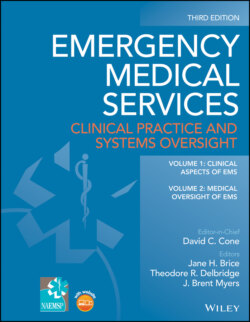Читать книгу Emergency Medical Services - Группа авторов - Страница 438
Obesity and bariatric surgery patients
ОглавлениеStatistics from 2018 estimate that 42.4% of U.S. adults are obese, a condition with known links to increased rates of diabetes and heart disease [44]. Obesity may also be linked to an increase in abdominal complaints including dyspepsia, irritable bowel syndrome, and constipation, as well as abdominal wall hernias that predispose patients to bowel obstructions [45]. The care of the obese patient may be hindered by an unreliable physical exam and equipment that is not suited for the patient’s size.
Not surprisingly, the rate of bariatric surgery has increased dramatically in recent years. Two thirds of these patients will seek medical care, with 29% getting hospitalized, representing a 4‐ to 5‐fold increased likelihood of admission in this population [46]. It is important to understand and recognize complications that include ulceration and bleeding, perforation, and mechanical obstruction. It is imperative that EMS clinicians be aware of the increased rate of these conditions in this patient population.
